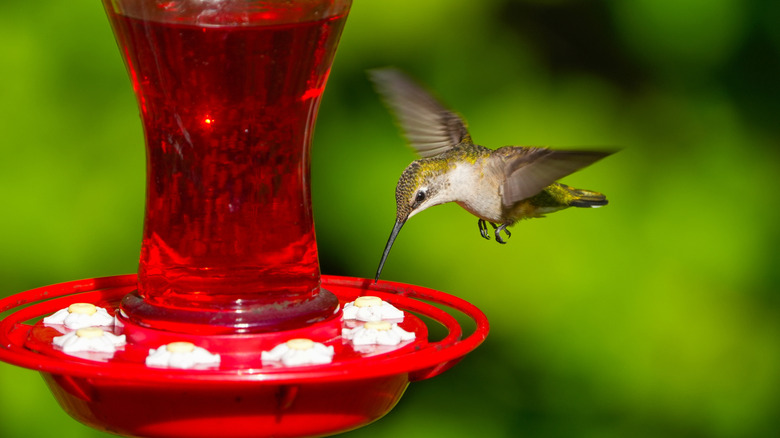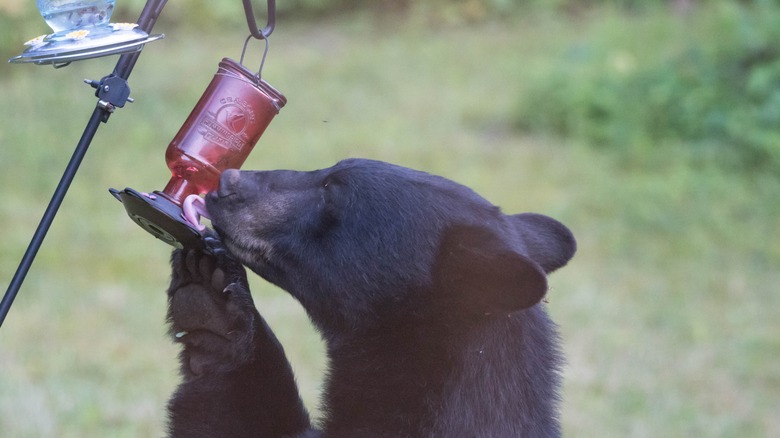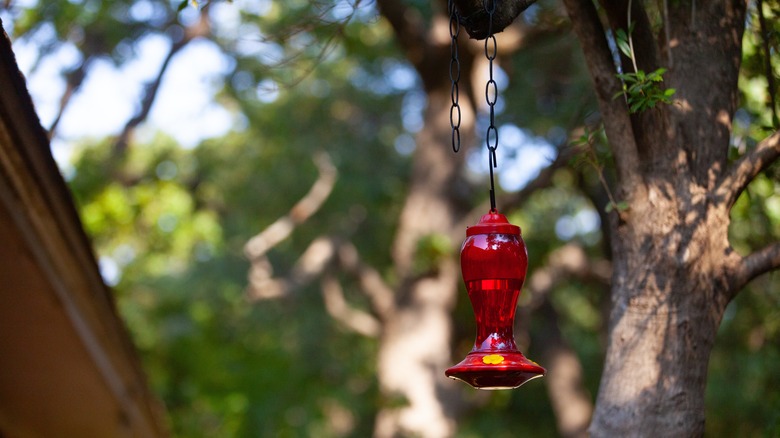Pests That Could Be Emptying Your Hummingbird Feeder At Night (& How To Deter Them)
Ever walk out to find your hummingbird feeder empty but you just filled it yesterday? If you think your feeder is only attracting these tiny but speedy birds, think again. You might be unwillingly hosting some surprising nocturnal visitors that can drain your feeder at night. Clever pests that may happily empty your feeder include bears, raccoons, bats, and sometimes even rats. These nighttime visitors are more than a nuisance, as the empty feeders can discourage hummingbird visitors. These evening feasts also mean that you constantly have to refill your feeder. Fortunately, you can try a few methods to deter them, including hanging the feeder higher, adding obstacles, and sprinkling repellent scents.
Not only are these nightly visitors to the nectar vessel a nuisance, but they may break your feeder or spill nectar on the ground, attracting insects in the process. Once armed with the knowledge of its location, they may return to the feed station over and over again, which means you're stuck buying more nectar. Here's a closer look at who visits, why, and how to keep them from making your nectar dispenser the neighborhood hotspot.
Why hummingbird feeders often have nighttime visitors
Many hummingbird feeder owners fill them with nectar, a sweet treat gathered from plants, or sugar water. Just like you may have a sweet tooth and love all things sugar, some animals can't get enough of sugary treats either. Armed with a sense of smell 2,100 times more powerful than our own, bears can detect and find a filled bird feeder from miles away. These incredible olfactory abilities mean they will make a beeline for your hummingbird feeder to drain it of its nectar. Their dogged pursuit may leave a destroyed patio in addition to a bare feeder in their wake.
While not as forceful as bears in their pursuit, raccoons also like to drink the sugary water, often climbing up poles or trees to get to it. Their clever minds and tiny paws make quick work as they eagerly slurp up the nectar. Some species of bats, such as the lesser long-nosed bat in the Southwestern United States, regularly eat nectar, so they won't hesitate to nibble at your feeder to fuel their migration. In addition, the Mexican long-tongued bat also recognizes the hummingbird favorite as a source of delicious food. Finally, while they don't have a widespread reputation of pillaging hummingbird feeders, rats may go after yours if given the opportunity.
Experts often recommend bringing hummingbird feeders in at night to reduce these instances, but that can be tiring or you may forget. Here are some alternative methods to help deter the visitors instead.
How to keep pests from your hummingbird feeder at night
Besides bringing your feeder inside, you can also explore moving the hummingbird feeder out of reach of Winnie-the-Pooh's paws. This may be hard, however, because some bears, such as black bears and grizzlies, are skilled climbers. You can briefly remove the nectar jar and see if the visits stop, then resume hanging it after a few days. To lessen the chances bears will even come into your yard, regularly remove any smelly garbage that may attract them.
When raccoons spot the nectar source, they will strike, shimmying up the nearby pole or tree to reach it. They are incredible problem solvers and need tough obstacles to block their entrance. One of the best tricks for keeping raccoons away from a hummingbird feeder is to install a steel baffle on its pole. A baffle is a long cylinder that blocks raccoons, in addition to other animals, from climbing to retrieve the contents from the feeding station.
If bats are a problem, you can use scent deterrents, such as citrus scraps or coffee grounds, on the ground around the nectar station to ward them off. You could also use an ultrasonic device featuring high-frequency sounds for repelling bats. However, you might want to skip this option. Research is ongoing, but some individuals report nausea and headaches in the presence of ultrasonic waves. Most of these deterrents should also work to keep rats away.


